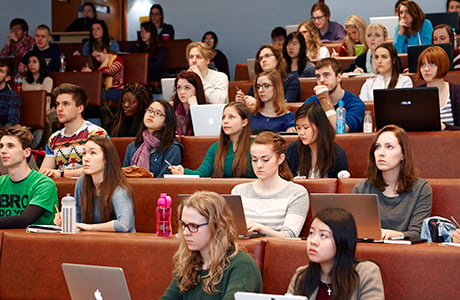
Physics
Course overview
UCAS code: F303
Entrance requirements: A*AA (with the A* in Physics, Maths or Further Maths)
Course duration: 4 years (MPhys); 3 years (BA)
Subject requirements
Required subjects: Physics and Maths
Recommended subjects: Maths Mechanics modules
Helpful subjects: Further Maths
Other course requirements
Admissions tests: ESAT
Written Work: None
Admissions statistics*
Interviewed: 31%
Successful: 11%
Intake: 173
*3-year average 2023-25
Contact
Tel: +44 (0) 1865 272200
Email: [email protected]
Unistats information for this course can be found at the bottom of the page
Please note that there may be no data available if the number of course participants is very small.
About the course
Physics is concerned with the study of the universe from the smallest to the largest scale: it is about unravelling its complexities to discover the way it is and how it works.
Discoveries in physics have formed the foundation of countless technological advances and play an important role in many scientific areas. Many techniques used in medical imaging, nanotechnology and quantum computing are derived from physics instrumentation. Even the World Wide Web was a spin-off from the information processing and communications requirements of high-energy particle physics.
The contributions of physics to solving global problems such as energy production, environmental protection, global warming and public health are essential and have an enormous impact on our society.
Oxford has one of the largest university physics departments in the UK, with an outstanding and very diverse research programme in six sub-departments:
- Astrophysics
- Atmospheric, Oceanic and Planetary Physics
- Atomic and Laser Physics
- Condensed Matter Physics (including BioPhysics)
- Particle Physics
- Theoretical Physics.
Physics at Oxford is challenging and mathematical with a strong emphasis on fundamental concepts such as optics and relativity.
There are two undergraduate courses, an MPhys and the BA. All applicants apply for the four-year MPhys in the first instance. The fourth-year MPhys option courses bring you to the threshold of current research, and can lead to subject specialism.
The department is equipped with state-of-the-art lecture facilities and teaching laboratories. Tutorials give students direct and regular access to physicists actively involved in research and provide an opportunity to explore scientific ideas with experts in the field.
Project work/international opportunities
In the third year, all students carry out a short project in the teaching laboratories. Students on both the BA and MPhys may have the opportunity to do industry projects investigating a real physics problem. There is further flexibility to undertake computational and experimental projects.
A wide choice of fourth-year MPhys projects is available across all six physics sub-departments.
 |  | |
'I’ve always wanted to study physics. I saw Apollo 13 when I was about 13 years old and there’s this bit where the scientists are trying to fit a square peg into a round hole – this made me want to work for NASA! But the more physics I study, the more I realise that there’s so much awesome stuff apart from astrophysics; I’ve ended up focusing on condensed matter which gets me thinking about the applications of physics in the real world. Learning the theoretical stuff is all very well, but I like being able to get useful things out of it. Karla-Luise | 'The tutorial system is one of the greatest things about studying at Oxford. Having to present your proofs and answers to world-leading mathematicians and academics on a twice-weekly basis can seem daunting, but it accelerates your understanding of difficult concepts and ideas, and equips you with the ability to deal with any other problems in a rigorous and precise way. The pace of the course is very rapid and the amount of material that is covered is vast. Very quickly, you will start to learn how to digest large volumes of information, understand it, and apply it to solving problems effectively. The ability to analyse situations critically, understand abstract problems and patterns, and apply a high level of computational knowledge are skills that are vital across all sectors and industries, both public and private, and are highly valued by employers.' Sara |
Unistats information
Discover Uni course data provides applicants with Unistats statistics about undergraduate life at Oxford for a particular undergraduate course.
Please select 'see course data' to view the full Unistats data for Physics.
Please note that there may be no data available if the number of course participants is very small.
Visit the Studying at Oxford section of this page for a more general insight into what studying here is likely to be like.
Physics
A typical week
In the first year your time will be equally divided between mathematics and physics, with about ten lectures and two tutorials a week, plus one day a week working on experimental physics in the practical laboratories.
In the second and third years the core and mainstream physics topics are covered in tutorials and small group classes. Practical work is also done during the year.
In the fourth year you will take two major options and the MPhys project.
Tutorials are usually given in colleges with 2-4 students and a tutor. Fourth year class sizes may vary depending on the options you choose. There would usually be no more than around 20 students though classes for some of the more popular papers may be up to 40 students.
Most tutorials, classes, and lectures are delivered by staff who are also college tutors in their subject. Many are world-leading experts with years of experience in teaching and research. Some teaching may also be delivered by postgraduate students who are usually studying at doctoral level.
To find out more about how our teaching year is structured, visit our Academic Year page.
Course structure
Year 1
Current courses | Assessment |
|---|---|
Short options, for example:
| First University examinations: four written papers; short option paper; satisfactory laboratory work |
Year 2
Current courses | Assessment |
|---|---|
Short options, for example:
| Final University examinations, Part A (BA and MPhys): three written papers; short option paper; laboratory work; individual presentation |
Year 3
Current courses | Assessment |
|---|---|
| Final University examinations, Part B: MPhys: Part A plus up to five written papers, short option paper, mini project, laboratory work; BA: Part A plus up to four written papers, short option paper, mini project, laboratory work, project report, optional industrial project |
Year 4
Research | Assessment |
|---|---|
Project and two option courses:
| Final University examinations, Part C (MPhys): project report; two major option papers |
Exams are taken in June at the end of each year of the courses. Most written papers are of 2.5 or 3 hours duration. Short options are shared across Years 1–3 and are examined by a 1.5 hour paper; the titles shown are illustrative and may change from year to year of the course.
More information about current options is available on the Physics website.
The content and format of this course may change in some circumstances. Read further information about potential course changes.
MMathPhys Year 4
The Physics and Mathematics Departments jointly offer an integrated master’s level course in Mathematical and Theoretical Physics. Physics students are able to apply for transfer to a fourth year studying entirely mathematical and theoretical physics, completing their degree with an MMathPhys.
The course offers research-level training in: Particle physics, Condensed matter physics, Astrophysics, Plasma physics and Continuous media.
Academic requirements
Qualification | Requirement |
|---|---|
A-levels: | A*AA to include Mathematics and Physics. The A* must be in Mathematics, Physics or Further Mathematics. |
Advanced Highers: | AA/AAB |
International Baccalaureate (IB): | 39 (including core points) with 766 at HL (the 7 should be in either Physics or Mathematics) |
Any other equivalent qualification: | View information on other UK qualifications, and international qualifications. |
Wherever possible, your grades are considered in the context in which they have been achieved.
Read further information on how we use contextual data.
Subject requirements
Essential: | Candidates are expected to have Physics and Maths to A-level, Advanced Higher, Higher Level in the IB or another equivalent. |
|---|---|
Recommended: | The inclusion of a Maths Mechanics module is also highly recommended. |
Helpful: | Further Maths is helpful to candidates in completing this course, although it is not required for admission. |
If a practical component forms part of any of your science A‐levels used to meet your offer, we expect you to pass it.
If English is not your first language you may also need to meet our English language requirements.
Applying
Admissions tests
| Test | ESAT |
| Test date(s) | Test dates will be announced in April 2026. Oxford applicants must book a test for the October sitting. |
All candidates must take the ESAT as part of their application.
All the information you need to arrange to take your test as well as how best to prepare can be found on the UAT-UK website.
Written work
You do not need to submit any written work when you apply for this course.
What are tutors looking for?
Tutors are looking for enthusiastic and highly-motivated students with the ability to apply basic principles to unfamiliar situations.
The language of physics is mathematics and formulating physical theories requires new mathematical structures. Therefore, the tutors are also looking for a good level of mathematical competence and the ability to formulate a problem in mathematical terms and then extract the physical consequences from the solution.
Visit the Physics website for more detail on the selection criteria for this course.
Careers
More than 40% of Physics graduates go on to study for a higher degree, leading to careers in:
- universities
- in industry
- in research and development
- technical consultancy
- manufacturing
- science education.
Many others enter professions unrelated to Physics, such as finance and business, where the analytical and problem-solving skills they have developed are highly sought-after.
We don't want anyone who has the academic ability to get a place to study here to be held back by their financial circumstances. To meet that aim, Oxford offers one of the most generous financial support packages available for UK students and this may be supplemented by support from your college.
Fees
Please note that for full-time Home undergraduate students, current university policy is to charge fees at the level of the cap set by the government, which for 2026/27 is £9,790. For details of annual increases, please see our guidance on likely increases to fees and charges. In the 2027/28 academic year course fees for Home fee status students will rise to £10,050 (in line with the government fee cap).
Fee status | Annual Course fees |
| Home | £9,790 |
| Overseas | £62,820 |
Further details about fee status eligibility can be found on the fee status webpage.
For more information please refer to our course fees page. Fees will usually increase annually. For details, please see our guidance on likely increases to fees and charges.
Living costs
Living costs at Oxford might be less than you’d expect, as our world-class resources and college provision can help keep costs down.
Living costs for the academic year starting in 2026 are estimated to be between £1,405 and £2,105 for each month you are in Oxford. Our academic year is made up of three eight-week terms, so you would not usually need to be in Oxford for much more than six months of the year but may wish to budget over a nine-month period to ensure you also have sufficient funds during the holidays to meet essential costs. For further details please visit our living costs webpage.
Financial support
Home | A tuition fee loan is available from the UK government to cover course fees in full for Home (UK, Irish nationals and other eligible students with UK citizens' rights - see below*) students undertaking their first undergraduate degree**, so you don’t need to pay your course fees up front. In 2026 Oxford is offering one of the most generous bursary packages of any UK university to Home students with a family income of around £50,000 or less, with additional opportunities available to UK students from households with incomes of £32,500 or less. The UK government also provides living costs support to Home students from the UK and those with settled status who meet the residence requirements. *For courses starting on or after 1 August 2021, the UK government has confirmed that EU, other EEA, and Swiss Nationals will be eligible for student finance from the UK government if they have UK citizens’ rights (i.e. if they have pre-settled or settled status, or if they are an Irish citizen covered by the Common Travel Area arrangement). The support you can access from the government will depend on your residency status. |
Islands | Islands students are entitled to different support to that of students from the rest of the UK. Please refer the links below for information on the support to you available from your funding agency: |
Overseas | Please refer to the "Other Scholarships" section of our Oxford Bursaries and Scholarships page. |
**If you have studied at undergraduate level before and completed your course, you will be classed as an Equivalent or Lower Qualification student (ELQ) and won’t be eligible to receive government or Oxford funding
Additional Fees and Charges Information for Physics
There are no compulsory costs for this course beyond the fees shown above and your living costs.
Contextual information
Unistats course data from Discover Uni provides applicants with statistics about a particular undergraduate course at Oxford. For a more holistic insight into what studying here is likely to be like, please view the information below and explore our website more widely.
The Oxford tutorial
College tutorials are central to teaching at Oxford. Typically, they take place in your college and are led by your academic tutor(s) who teach as well as do their own research. Students will also receive teaching in a variety of other ways, depending on the course. This will include lectures and classes, and may include laboratory work and fieldwork. However, tutorials offer a level of personalised attention from academic experts unavailable at most universities.
During tutorials (normally lasting an hour), college subject tutors will give you and one or two tutorial partners feedback on prepared work and cover a topic in depth. The other student(s) in your tutorials will typically be doing the same course as you and covering the same topic. Such regular and rigorous academic discussion develops and facilitates learning in a way that isn’t possible through lectures alone. Tutorials also allow for close progress monitoring so tutors can quickly provide additional support if necessary.
Read more about tutorials and an Oxford education
College life
Our colleges are at the heart of Oxford’s reputation as one of the best universities in the world.
- At Oxford, everyone is a member of a college as well as their subject department(s) and the University. Students therefore have both the benefits of belonging to a large, renowned institution and to a small and friendly academic community. Each college or hall is made up of academic and support staff, and students. Colleges provide a safe, supportive environment leaving you free to focus on your studies, enjoy time with friends and make the most of the huge variety of opportunities.
- Each college has a unique character, but generally their facilities are similar. Each one, large or small, will have the following essential facilities:
- Porters’ lodge (a staffed entrance and reception)
- Dining hall
- Lending library (often open 24/7 in term time)
- Student accommodation
- Tutors’ teaching rooms
- Chapel and/or music rooms
- Laundry
- Green spaces
- Common room (known as the JCR).
- All first-year students are offered college accommodation either on the main site of their college or in a nearby college annexe. This means that your neighbours will also be ‘freshers’ and new to life at Oxford. This accommodation is guaranteed, so you don’t need to worry about finding somewhere to live after accepting a place here, all of this is organised for you before you arrive.
- All colleges offer at least one further year of accommodation and some offer it for the entire duration of your degree. You may choose to take up the option to live in your college for the whole of your time at Oxford, or you might decide to arrange your own accommodation after your first year – perhaps because you want to live with friends from other colleges.
- While college academic tutors primarily support your academic development, you can also ask their advice on other things. Lots of other college staff including welfare officers help students settle in and are available to offer guidance on practical or health matters. Current students also actively support students in earlier years, sometimes as part of a college ‘family’ or as peer supporters trained by the University’s Counselling Service.
Connect with us
Outreach programmes and events
Many academic departments and faculties at Oxford have dedicated outreach events and activities aimed at promoting their subject area(s) and supporting talented students from all backgrounds to apply to their courses.
University-wide events and resources
In addition to exploring department-run activities, we recommend checking out the outreach event calendar for upcoming University-wide events and other subject and college activities.
Subject-specific resources supporting supercurricular engagement for all ages can also be found via the University's Digital Resource Hub, suggested subject resources webpage and Oxplore, our online learning platform for 11-to-18-year-olds.
UK state school students interested in this or similar courses may like to explore UNIQ, Oxford's free flagship outreach programme for students in their first year of further education. UNIQ offers a choice of academic residentials in over 30 courses and each year provides around 1,500 students with the opportunity to experience Oxford's teaching, explore student life and receive expert support with their application to university.
Prospective applicants can sign up to receive step-by-step support with their Oxford application.
Read more about Oxford's widening access initiatives and other ways to connect with us before applying.

